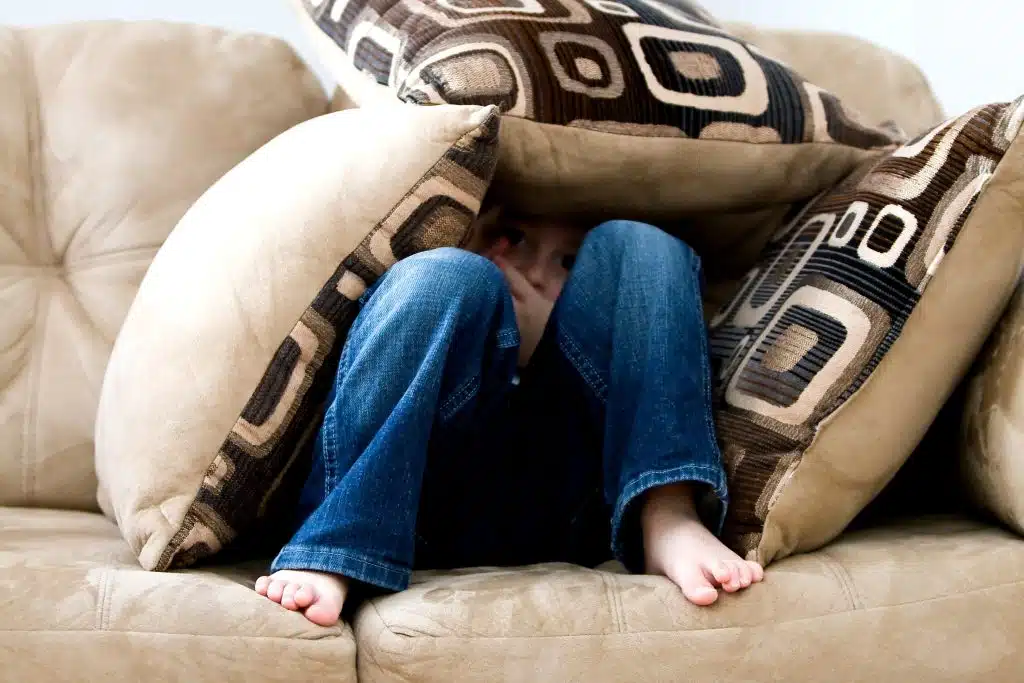Did you know that by some estimates, childhood anxiety affects nearly 10% of kids? What are the signs of anxiety in kids, anyway? How do you know if you’re witnessing it in your own child? Life’s not always smooth, especially when caring for children with thinking and learning differences. If you’re looking for quick but reliable answers, that’s precisely what you’ll get here. Today, we’re identifying three signs of anxiety in kids. We’re not just listing them; we’re breaking them down with real-world examples and tips you can start using today. So stick around.
Table of Contents
Unexplained Physical Symptoms
Sometimes, signs of anxiety manifest physically. Kids might complain about headaches or stomachaches more often than usual, and no medical reason seems to exist.
In other words, your kid’s body is doing the talking for what they can’t express verbally. It’s their way of saying, “Hey, something’s not right here!” So, if your little guy or gal is more attached to the Pepto-Bismol than their favorite toy, it could be a sign to look closer.
What To Do About It:
- Talk to a Pediatrician: Rule out any medical concerns first.
- Open Dialogue: Encourage your child to talk about how they’re feeling.
- Mindfulness Techniques: Teach simple breathing exercises to help manage physical symptoms.

Behavioral Changes and Mood Swings
Kids can be naturally moody, certainly. But notice any drastic changes in behavior or mood, especially in neurodivergent kids. It may be anxiety lurking in the background.
For instance, it’s worth paying attention if your generally bubbly child has become withdrawn or your curious adventurer now avoids new experiences. These changes in behavior can seem sudden or develop gradually over time. Either way, they require your keen observation and action.
What To Do About It:
- Keep a Behavior Log: Jot down instances of mood swings or changes.
- Consult a Specialist: Especially for kids with thinking and learning differences, a tailored approach can help.
- Set a Routine: Predictability can help alleviate anxiety.

Read more: Is it ADHD or Anxiety Quiz
Difficulty in Social Situations
Anxiety in kids can make social interactions a real struggle. Your kid might avoid playdates, parties, or even school to steer clear of social settings.
That is to say, they’re not avoiding fun; they’re avoiding the stress that comes with it. Social situations can feel like walking through a minefield for an anxious kid. They might struggle with eye contact or stick to you like glue during social events.
What To Do About It:
- Rehearse Scenarios: Practice can ease social worries.
- Offer Choices: Let them choose social activities they’re comfortable with.
- Praise Small Wins: Every positive social interaction is a step forward.
Tired of Emotional Meltdowns?
Goally’s Mood Tuner app has activities for kids with BIG emotions. Teach kids how to tune their mood with Goally. See fewer meltdowns.
The Mood Tuner app encourages kids to look inwards and identify their feelings, helping them understand what’s going on inside. Once they’ve recognized their emotions, they can choose from a 20+ activities designed to help them self-regulate and find their balance.

Navigating the maze of parenting is tough, especially when anxiety throws you curveballs. But you’re not alone. Recognizing signs of anxiety in your kids is the first step towards a happier and healthier life for them—and a little less worry for you. Above all, don’t be afraid to seek professional help. You’re not admitting defeat; you’re gathering an army. You’re already doing an incredible job, and with a little extra knowledge and a few more tools in your toolkit, you’ll be even more impressive at this ever-challenging, ever-rewarding job called parenting.
FAQ’s About Signs of Anxiety in Kids
What are common signs of anxiety in kids?
Common signs include unexplained physical symptoms like stomachaches, drastic changes in behavior, and difficulty in social situations.
How can I distinguish signs of anxiety from regular childhood behavior? If the symptoms are persistent, cause considerable distress, and interfere with daily activities or social interactions, they could indicate anxiety.
What should I do if I notice signs of anxiety in my child?
Consult with a healthcare provider for a proper diagnosis and personalized treatment plan.
Can tools like visual schedules help kids with anxiety? Yes, visual schedules can provide structure and predictability, which often help alleviate symptoms of anxiety.
Are emotional regulation apps effective for managing anxiety in kids? Emotional regulation apps can offer useful coping strategies and immediate relief during anxious moments.
This post was originally published on 09/15/2023. It was updated on 06/01/2024.
Emily is a seasoned blog writer for Goally, leveraging her extensive background in child psychology and special education to provide valuable insights and resources for parents. Her commitment to understanding and addressing the unique needs of these children, combined with her expertise in educational strategies, makes her a credible and empathetic voice for families.





